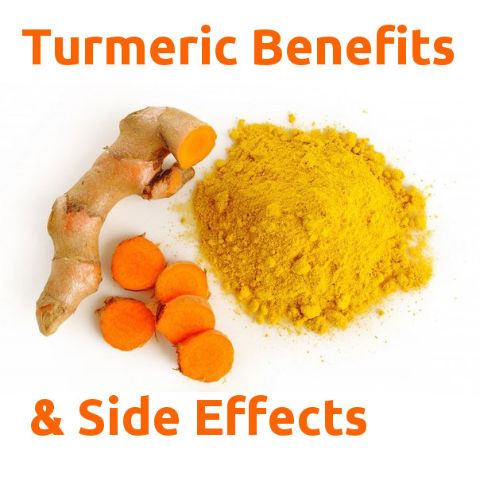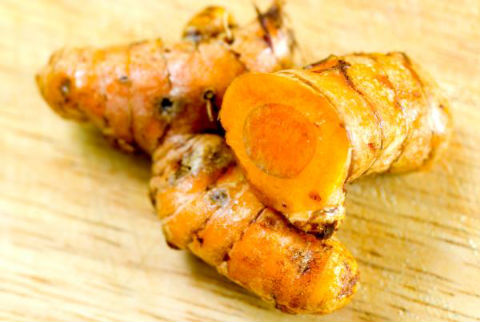Turmeric Health Benefits and Side Effects

Article Contents:
What is Turmeric
Natural health remedies are many. Turmeric health benefits are being discovered every day to this day. Turmeric is a commonly used herb that is also classed as a spice, renowned for its peppery aroma and bright golden colour. It is used in a variety of dishes all over the world, but its application just does not end there.
In this article, we shall take a closer look at turmeric and its benefits and any side effects.
An overview of Turmeric
Turmeric, also called Curcuma longa is a herbaceous plant that belongs to the ginger family. Once harvested, it is washed, dried and then ground into a powder which is then used for a variety of purposes. It is native to Asian countries, and forms a staple part of foods cooked in India and Pakistan.
But its uses extend beyond cooking and food; they are also used as a part of Indian traditional medicine. It has been found to possess antibacterial and anti-fungal properties and is sometimes prescribed by alternative medicine as treatment for various ailments.
Forms of turmeric
Turmeric is available in a variety of forms in which it is used. These include –
1. Powder – The powdered form of turmeric is prepared by washing and oven drying the turmeric rhizome, which is then ground into a fine golden yellow powder. This powder is added in small quantities to foods for taste and sometimes just for colour. It is added during the initial stages of cooking, and thus imparts its unique flavour and colour to the dish. It is not just used in Indian cooking, it also used in oriental cuisine.
Powdered turmeric is also added to traditional skin creams, which have a cooling and soothing effect in addition to its antibacterial properties.
2. Whole rhizome – In some cases, turmeric is sometimes used as whole rhizome. It is available as a pickle that is slow cooked with spices so it remains soft, imparting a delicate flavour to the pickle.
3. Turmeric leaves – Turmeric leaves are used in cooking as well, particularly in oriental cuisine.
Turmeric Benefits

The health benefits of turmeric are many – most of them are related to its medicinal use. It is rich in anti-oxidants, making it extremely useful in managing a number of different clinical conditions. Research conducted has demonstrated turmeric to have the following uses –
1. Treatment of arthritis – It is believed to help treat osteoarthritis by reducing inflammation and swelling.
2. Treatment of problems with digestion such as stomach aches, excessive gas, diarrhoea and excessive bloating sensation. It is commonly prescribed as a natural remedy for these purposes.
3. Treatment of liver disease and problems with the gall bladder. Patients with liver and gall bladder disease develop jaundice, and turmeric has been shown to reduce this. The evidence however is not scientifically solid.
4. Chest disease such as the common cold, bronchitis and chest infections.
5. Certain forms of cancer management – Turmeric has been shown be of benefit in managing patients with prostate cancer and some forms of blood cancer.
6. Alzheimer’s disease and depression management – While it does not cure Alzheimer’s disease, turmeric has shown to help slow down the progression of this debilitating condition.
7. Menstrual problems – Turmeric is believed to have an effect on uterine contractions and can help treat menstrual problems.
8. Treatment of infections – It is useful as a topical application on wounds, cuts, bruises and burns, and can help prevent infections and promote healing.
Many of these benefits are not scientifically proven, but anecdotal evidence has shown turmeric to possess these benefits, and more are being discovered every day.
Side effects of turmeric
The general evidence suggests that turmeric is safe for consumption and as a medicinal product. Some people report mild stomach upset and occasional diarrhoea, but this is usually sensitivity to turmeric rather than side effects. It is unclear what it would do if consumed in large quantities.
Turmeric has to be used with caution in pregnant women, as it is believed that turmeric has effects on the uterine wall. It can cause bleeding by preventing blood clotting, and should therefore be avoided if undergoing surgery. It is due to this side effect that turmeric should be avoided in patients who are taking blood thinning medication such as warfarin, aspirin and clopidogrel, as it can result in excessive bleeding in the event of an injury or ulcer in the stomach. Lastly, there is information that turmeric may interfere with some drugs used in chemotherapy, therefore who are undergoing chemotherapy should consult with their doctors on taking curcumin.
Dosing of turmeric
If taking turmeric to manage different clinical conditions, evidence suggests the use of 500mg of turmeric 4 times a day for stomach problems and 500mg twice a day for managing patients with osteoarthritis.
Turmeric Recipes
Turmeric is used in a number of different cuisines, and here are 2 recipes where it is used.
1. Tarka dal
This is a spicy lentil dish that utilises turmeric for its colour and spice properties. Once lentils are boiled till they are fully cooked, they are whisked till they are broken down and are set aside. In a separate pan, a little oil is heated and cumin seeds, chopped onion and ginger and chopped green chillies are added. Garlic and tomatoes are pureed and added to this. Turmeric along with garam masala are added, and the daal is added to this. The mixture is heated for another 10 minutes, and salt is added to taste. The dish is finished off with coriander leaves and is served with warm naan bread.
2. Singapore style noodles
In a hot wok, add groundnut oil and stir in ginger, mushrooms, chilli and turmeric for fry for a few seconds. To this are added red peppers, carrots, bean sprouts and cooked chicken. After this has fried for a few seconds, the noodles are added along with soy sauce, oyster sauce and vinegar. Beaten egg is added to this and the dish is fried for a minute or so. It is finished off with a dash of sesame oil and served with a garnish of spring onions.
Conclusion
Turmeric is a versatile plant with medicinal and culinary uses. Turmeric benefits are extensive and side effects are few. It comes as no surprise that this is a popular choice in foods and traditional medicine.
GLKing
August 24, 2013 @ 10:57 am
So I’m curious to know what information was used to write this article.
According to the Article, “Turmeric has not been studied in great amount of detail” but according to this article Turmeric has been involved in over 5600 peer-reviewed and published biomedical studies. One would think that 5600 studies is a “great amount of detail”. Now I have not gone and read all 5600, so it could just as easily be 56, but the fact is that Turmeric has been studied in great detail.
As I said, just curious. I have a number of ailments that research shows Turmeric can be very beneficial. And also according to the article I linked, “Another way in which turmeric and its components reveal their remarkable therapeutic properties is in research on drug resistant- and multi-drug resistant cancers.” But yet your article suggests avoiding Turmeric like the plague if you undergoing Chemotherapy.
Taylor
January 11, 2014 @ 7:19 pm
I just took a small amount of turmeric powder in some water. Got 3 swallows down, couldn’t stand any more. It seemed to quiet my stomach pain down, though. I’ve had gastritis for more then 40 years. It kicked in big time a month ago. It’s caused by h pylori. No appetite, pain in stomach. PPI’s not working. I’m curious to see if this works. I’ll check back later and let you know. Anything is worth a try.
Alvin Harjit
March 5, 2016 @ 1:48 am
Hi, m also having some pain in the stomach for the last few days now..so m gonna try this method n see if it works.
Rava
August 26, 2013 @ 12:55 am
Thank you for your valuable notes. After researching on this subject I would agree with the point that turmeric was studied in a good number of studies, hence this has been corrected in the article.
Although in terms of taking turmeric during chemotherapy there is information that it can interfere with some chemotherapy treatments and reduce their benefits. Here are a couple of links on that:
Therefore a general advice for those who are currently undergoing chemotherapy would be to consult with their oncologists before taking turmeric.
RAVICHANDRAN
April 20, 2014 @ 4:25 am
You also can add “Turmeric stops bleeding when applied on bleeding wounds” like knife cuts, shaving cuts in addition to the points mentioned in item no 8